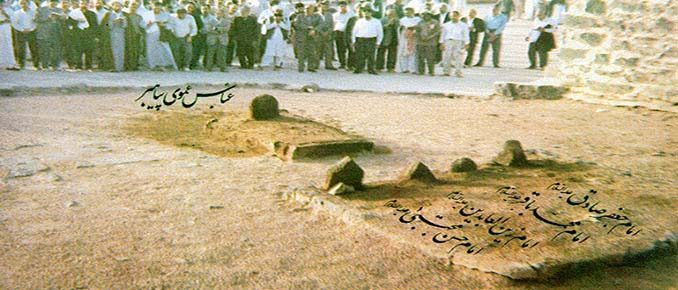
The skeptics condemn the Shias for building structures / shrines over graves and worshipping inside these shrines.
Their central argument revolves around the tradition related by the Holy Prophet (s.a.w.a.) concerning the actions of the Jews and the Christians in relation to graves.
According to reports, the Jews and Christians have been condemned for taking the graves of their prophets as places of worship.
Based on such traditions, these hardline Muslims conclude that those who build graves are also subject to condemnation.
Reply
It is clear to all Muslims – both in the era of the Holy Prophet (s.a.w.a.) as also in subsequent eras that the tone and tenor of this and other such traditions prohibits the worshipping of graves as one worships Allah.
Praying near the grave to achieve divine proximity through the person buried inside the grave or turning toward the inmate of the grave with the intention of securing a reliable channel towards Allah is not prohibited, rather it is highly recommended.
The objective of the Muslims behind praying and reciting supplications near the graves of Allah’s Prophets (s.a.w.a.) and his righteous servants is not different from the objective of the angels of Allah who prostrated in front of Prophet Adam (a.s.) on divine command. Or the respect accorded by the brothers of Prophet Yusuf (a.s.) and his parents – including his father Prophet Yaqoob (a.s.) to Prophet Yusuf (a.s.).
Interpretation of traditions condemning the Ahle Kitab for building graves
It is clear from the Quran and Sunnah and actions of the Salaf that building of graves is permitted and even recommended in case of esteemed personalities. Then how does one reconcile the apparent prohibition in some traditions?
Many Ahle Tasannun scholars have explained it in their books – only if the skeptics had referred to these books.
Both the Ibn Hajars (Haythami and Asqalaani) among other scholars have advanced a rationale for such traditions, which is so plain, even a child can understand it.
Ibn Hajar al-Haythami, a stringent critic of the Shias, in his Al-Zawajir an Iqtiraf al-Kabaair elaborates on the Ahle Kitab condemnation tradition that the prohibition for building graves is if the prayer is performed towards or on the grave and this is only if one prays so close to it that if while praying the prayer of those attentive (looking down), the grave would be within one’s sight.
This was the method of the prayers of Jews and Christians and hence the prohibition. No one in the history of Islam took this tradition as proof of prohibition for the building of tombs/shrines over righteous Muslims, as Muslims do not worship in this manner.
Likewise, Ibn Hajar al-Asqalaani states:
In view of the fact that the Jews and Christians were taking the graves of their prophets as their Qiblah for the purpose of respect and were paying attention towards them at the time of their prayers, their graves took the position of idols. For this reason, the Muslims have been forbidden from this action. However, if someone constructs a mosque near the grave of a pious person for the purpose of seeking blessing (tabarruk) and not for prostration (of worship) or paying attention towards them, he will never be included in this prohibition (as mentioned in Surah Kahf (18): Verse 21)
- Fath al-Baari vol 3 pg 208
Clearly, the skeptics are wittingly or unwittingly mixing up worshipping of graves practiced by the Jews and Christians with intercession-seeking via personalities inside graves. The former is shirk and condemnable, while the latter is Tauheed and praiseworthy.




Be the first to comment